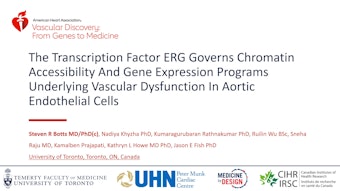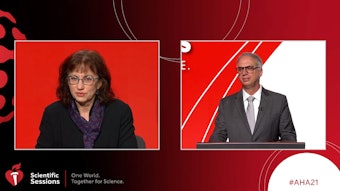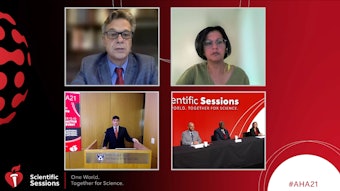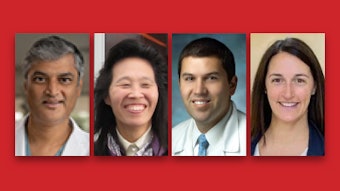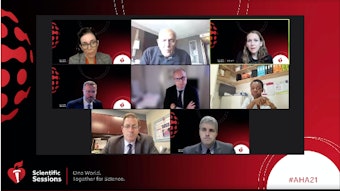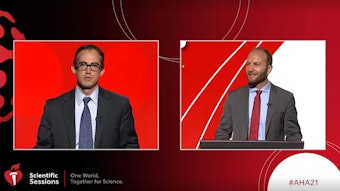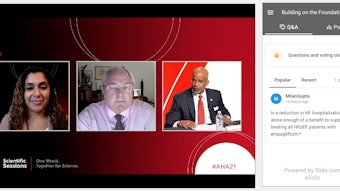Drs. Kiran Musunuru and Katey Rayner share the 2021 Joseph A. Vita Award

Kiran Musunuru, MD, PhD, MPH, ML, FAHA, and Katey Rayner, PhD, received the 2021 Joseph A. Vita Award.
The award is given annually in honor of the late cardiovascular scientist Joseph A. Vita, MD, to recognize research that had a major impact on the field of cardiovascular biology or cardiovascular health during the last five years. Dr. Vita was the founding editor of the Association’s Open Access, peer-reviewed, Journal of the American Heart Association (JAHA). Dr. Musunuru is professor of medicine, scientific director of the Penn Center for Inherited Cardiovascular Disease and director of Genetic and Epigenetic Origins of Disease Program at the Cardiovascular Institute at the Perelman School of Medicine at the University of Pennsylvania in Philadelphia. Dr. Rayner is a research scientist and director of the Cardiometabolic microRNA Laboratory at the University of Ottawa Heart Institute and assistant professor of biochemistry, microbiology and immunology at the University of Ottawa in Ottawa, Canada.
Dr. Musunuru was selected as a 2021 recipient of the Joseph A. Vita Award because of his impressive work in therapeutic gene editing to combat cardiovascular disease. Other key achievements include discovering an LDL cholesterol regulating gene, inspiring development of multiple ANGPTL3-inhibiting drugs, using gene-edited human stem cells for disease modeling, and his pivotal work in functional genomics. In his lab, Dr. Musunuru developed processes to use gene editing technology to permanently reduce cholesterol levels and therefore provide protection against heart attack and stroke through a one-time injection. This strategy, which he likens to a vaccination, has been very successful in mice and monkeys, and he is working diligently to advance it to human trials.
"I'm grateful to the American Heart Association for recognizing the ongoing efforts to translate cardiovascular gene editing from the research laboratory to clinical settings, and I'm honored to be given the opportunity to carry forward Dr. Vita's legacy,” said Dr. Musunuru. “None of my recent work would have been possible without strong mentorship and staunch support, past and present, especially from Sekar Kathiresan, Daniel Rader, Thomas Cappola and the leadership of the University of Pennsylvania.”
Dr. Musunuru is board certified in internal medicine and cardiovascular disease and earned his PhD, in biomedical sciences from The Rockefeller University, a medical doctorate from Weill Cornell Medical College, a master’s of public health in epidemiology from Johns Hopkins Bloomberg School of Public Health, and a master’s in law from the University of Pennsylvania Law School. He completed a clinical fellowship in cardiology at Johns Hopkins Hospital and completed a clinical and research fellowship in cardiology at Massachusetts General Hospital in Boston. He is a past editor-in-chief and current senior consulting editor for Circulation: Genomic and Precision Medicine. Dr. Musunuru also serves on numerous committees at the Perelman School of Medicine at the University of Pennsylvania.
Dr. Musunuru has been an active member of the association since 2007. He is a member of the planning committee for the High School Minority Outreach Program, a member of the Science and Clinical Education Lifelong Learning Committee, and chair of the task force for Modernization of AHA Scientific Statements. This is his sixth recognition from the AHA, having previously been a finalist for the 2009 Jeremiah and Rose Stamler Research Award for New Investigators and winning the 2010 Functional Genomics and Translational Biology Young Investigator Award, the 2016 Award of Meritorious Achievement, the 2017 Functional Genomics and Epidemiology Mid-Career Research Award and Lecture, and the 2020 Council on Clinical Cardiology Distinguished Achievement Award.
Dr. Rayner was selected because of her contributions to cardiovascular research and her discovery of the critical role microRNAs play in 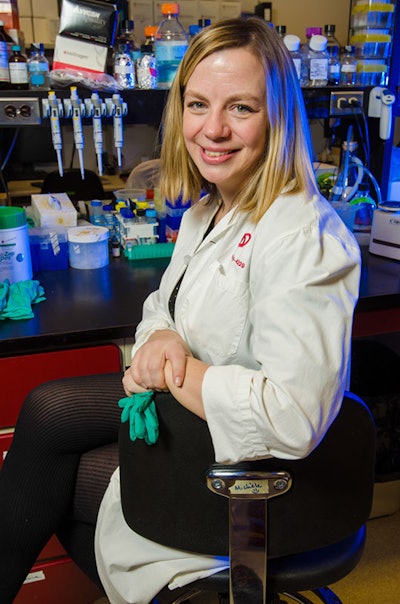 Katey Rayner, PhD
Katey Rayner, PhD
“I’m honored to be recognized with this year’s Joseph A. Vita Award,” said Dr. Rayner. “I’m fascinated by the relationship between inflammation and cardiometabolic disease. I hope recognition for this type of work helps to advance our understanding of these types of relationships and the role RNA can play in the treatment of diseases. The American Heart Association has always helped us communicate our findings to the wider scientific community, and I am grateful that the AHA journals continue to publish research of the highest quality, and I am honored to be recognized for my group’s contributions.”
Her research is focused on dysregulated inflammation in metabolic diseases, such as atherosclerotic vascular disease and exploring how RNA biology can be used in future therapies. Dr. Rayner is a graduate of the University of Ottawa. She completed her fellowship at Harvard Medical School and New York University School of Medicine. Dr. Rayner is part of the peer-review committees for the Canadian Institutes of Health Research, National Institutes of Health and the Heart and Stroke Foundation of Canada. She is an editorial board member for Arteriosclerosis, Thrombosis and Vascular Biology; and Circulation Research.
Dr. Rayner is an active member of the AHA who holds several leadership positions. She is the chair of the communications committee, past chair of the Early Career Committee and member of the leadership committee for the Arteriosclerosis, Thrombosis and Vascular Biology Council; member of the Council Operations Committee; and member of the Scientific Sessions Program Committee. This is her fourth award from the association, having previously been recognized with the 2008 Junior Investigator Award for Women, 2010’s Irving Page Young Investigator Award and 2019’s Daniel Steinberg Early Career Investigator Award for her article “Extracellular Vesicles Secreted by Atherogenic Macrophages Transfer MicroRNA to Inhibit Cell Migration.”


